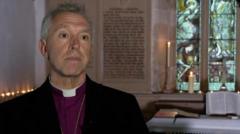Is Ex-Archbishop Revealing the Truth About Church Crisis?

The Complex Decision to Retire: Reflections from the Former Archbishop of Wales
The recent retirement of the former Archbishop of Wales, Andrew John, has sent ripples through the Church and the community. In an emotional interview with BBC Radio Cymru's Bwrw Golwg, he shared insights into his decision, the challenges he faced, and the broader implications for the Church. As we delve into his reflections, it's vital to understand the context behind his retirement and the significant issues that led to this pivotal moment in Welsh ecclesiastical history.
Understanding the Context of the Retirement
The announcement of Andrew John's retirement came on the heels of two critical reports that highlighted troubling issues within the Diocese of Bangor. These reports mentioned a "culture in which sexual boundaries seemed blurred," excessive alcohol consumption, and governance and safeguarding weaknesses. Although there were no allegations of inappropriate behavior against John himself, the Church's representative body felt that a change in leadership was necessary to address these significant concerns.
In his interview, John expressed the emotional toll that the decision to retire had taken on him. He described the experience as "painful," stating, "my mental health has suffered in a way I've never experienced before." This candid acknowledgment of his struggles underscores the weight of leadership in times of crisis, particularly within an institution that holds significant cultural and spiritual influence.
The Impact of Leadership Decisions
Leadership within the Church often involves navigating complex and sensitive issues, especially when it comes to safeguarding vulnerable populations. John noted that being present at a meeting where calls for his resignation echoed around him felt like "being in a nightmare." This sentiment reflects the high stakes involved in ecclesiastical leadership, where decisions can have far-reaching consequences for the community and the institution.
Addressing the Culture Within the Church
John's reflections also highlighted a concerning drinking culture surrounding the choir at Bangor Cathedral. He expressed shock upon learning about the extent of this culture, stating, "The idea that they went out after important services until late saddens me." Such revelations are particularly troubling within a religious context, where the expectation is that leaders and congregants alike model appropriate behavior.
Moreover, John acknowledged the unacceptable nature of inappropriate jokes made around children, emphasizing the need for cultural change within the Diocese. His admission of prior mismanagement further adds to the complexity of his role and the challenges faced by the Church. As he noted, "a lot of mistakes had been made," and recognizing these missteps is crucial for fostering accountability and promoting healing within the community.
Financial Decisions and Accountability
Financial mismanagement has also been a prominent issue within the Diocese. John admitted to shortcomings in this area but defended certain expenditures, such as £20,000 spent on trips to Rome and Dublin. He asserted, "It's not extravagant with 20 people travelling," indicating a belief that these investments were justified. This aspect of his reflection raises questions about resource allocation and stewardship within the Church, particularly when financial transparency and accountability are critical to maintaining trust among congregants.
The Regret of Leadership
When asked about his biggest regret during his tenure, John highlighted the lack of proper structural support within the cathedral to address the challenges faced. "It pains me that these things happened under my watch," he confessed, illustrating the burden leaders carry when issues arise during their leadership. His acknowledgment of being part of the problem reflects a level of humility and accountability that is often lacking in leadership roles.
John's recognition of Bangor as a "fantastic diocese" reveals his deep connection to the community and his desire to see it thrive despite the challenges it faces. However, he also recognized that rebuilding trust and implementing change would require time and collective effort. "I think change will take years," he remarked, emphasizing the need for collaboration within the Church to ensure a healthier future.
Social Media and Public Perception
In today's digital age, social media plays a significant role in shaping public perception. John admitted that the criticism he faced online was difficult to endure. "It's been very difficult to see what people are saying on social media," he confided. The nature of public discourse surrounding leadership can often be harsh, exacerbating the already challenging emotional landscape for those in positions of authority.
He added, "I'm a bishop and a leader in the church; these things have happened during my tenure, so it's only right to give someone else the opportunity to take responsibility for the future." This statement underscores the importance of accountability and the need for new leadership to guide the Church through this tumultuous period.
Looking Ahead: The Future of the Diocese
As Andrew John prepares to step down as Bishop of Bangor next month, the focus will inevitably shift to the future of the Diocese and how it will address the challenges laid bare by the recent reports. The need for governance reforms, safeguarding measures, and a renewed commitment to ethical conduct will be paramount in restoring trust within the community.
The next bishop will face the daunting task of navigating these complex issues while fostering an environment of transparency and accountability. This transition period presents an opportunity for the Church to reflect on its values and priorities, ensuring that the lessons learned from this experience lead to lasting change.
Encouraging a Culture of Openness
As the Diocese moves forward, fostering a culture of openness and dialogue will be essential. Whistleblowers and congregants must feel encouraged to speak out about their concerns without fear of reprisal. John’s reflections on the importance of treating whistleblowers with confidentiality highlight the need for a supportive environment where individuals can voice their concerns safely.
Moreover, emphasizing the importance of safeguarding practices will be vital in rebuilding community trust. This commitment to protecting the vulnerable should be at the forefront of the Diocese's mission as it works to create a safe and welcoming environment for all congregants.
Conclusion: A Call for Reflection and Change
The retirement of Andrew John as Archbishop of Wales is a poignant reminder of the complexities of leadership within the Church. His reflections on the challenges he faced, the need for cultural change, and the importance of accountability resonate deeply within the broader context of religious leadership. As the Diocese of Bangor embarks on a new chapter, it will be crucial to address the issues that have surfaced and work collaboratively towards a healthier, more transparent future.
Reflecting on these developments, one cannot help but ponder the role of leadership in fostering ethical behavior within institutions. How can the Church, and indeed other organizations, learn from these challenges to create a culture of integrity and accountability? As we move forward, let us consider the lessons learned from Andrew John's tenure and strive for a future where transparency and ethical leadership are paramount.
FAQs
What led to the retirement of Andrew John as Archbishop of Wales?
Andrew John's retirement was prompted by two critical reports highlighting issues of governance, safeguarding weaknesses, and a concerning culture within the Diocese of Bangor.
How did Andrew John feel about the decision to retire?
John expressed that the decision was painful and affected his mental health, but he believed it was the right choice for himself and the Church moving forward.
What changes are necessary for the Diocese of Bangor following these reports?
The Diocese must implement governance reforms, improve safeguarding measures, and foster a culture of transparency and accountability to address the issues raised in the reports.
What was Andrew John’s biggest regret during his tenure?
John cited his regret for not ensuring a proper structure was in place within the cathedral to address ongoing issues, acknowledging that these challenges occurred under his leadership.
As we reflect on these events, how can the Church ensure that accountability and transparency remain its guiding principles in the future? #Leadership #Transparency #ChurchReform
Published: 2025-07-05 21:07:04 | Category: wales



